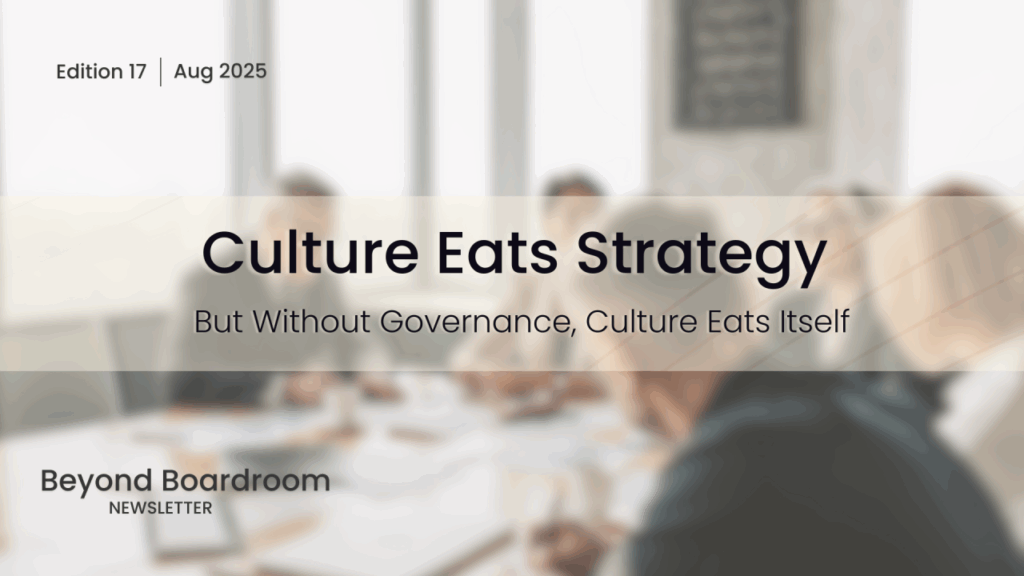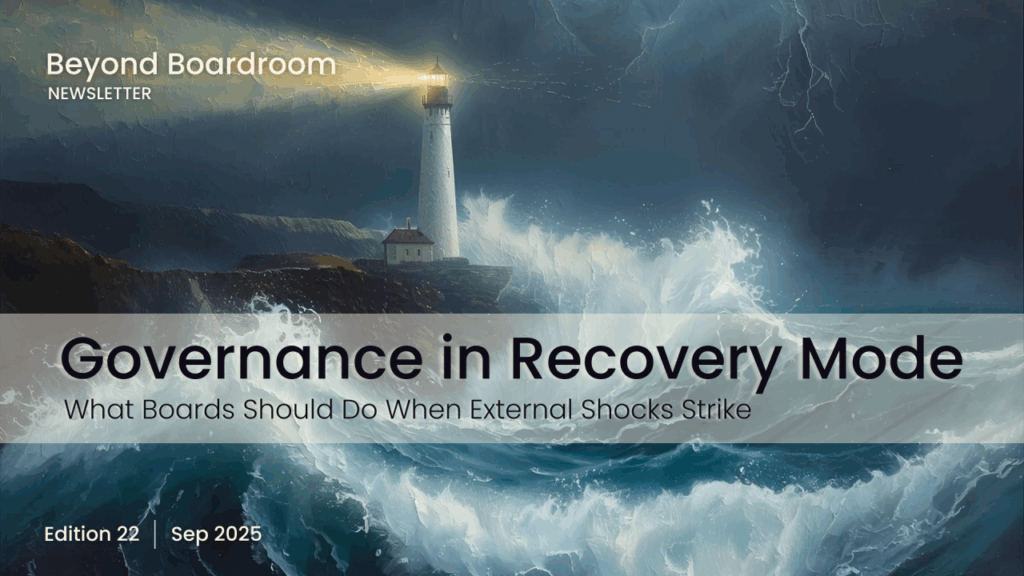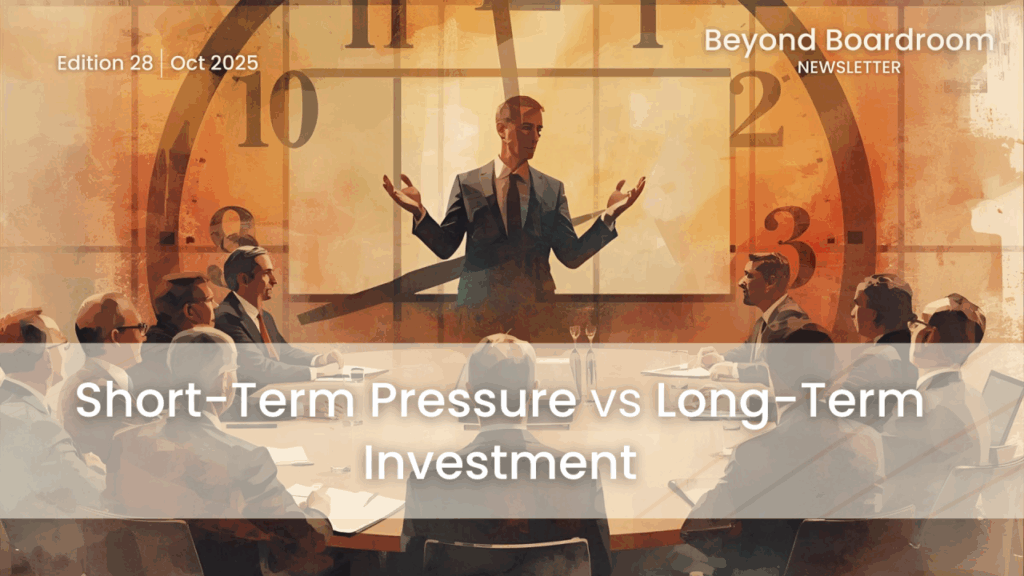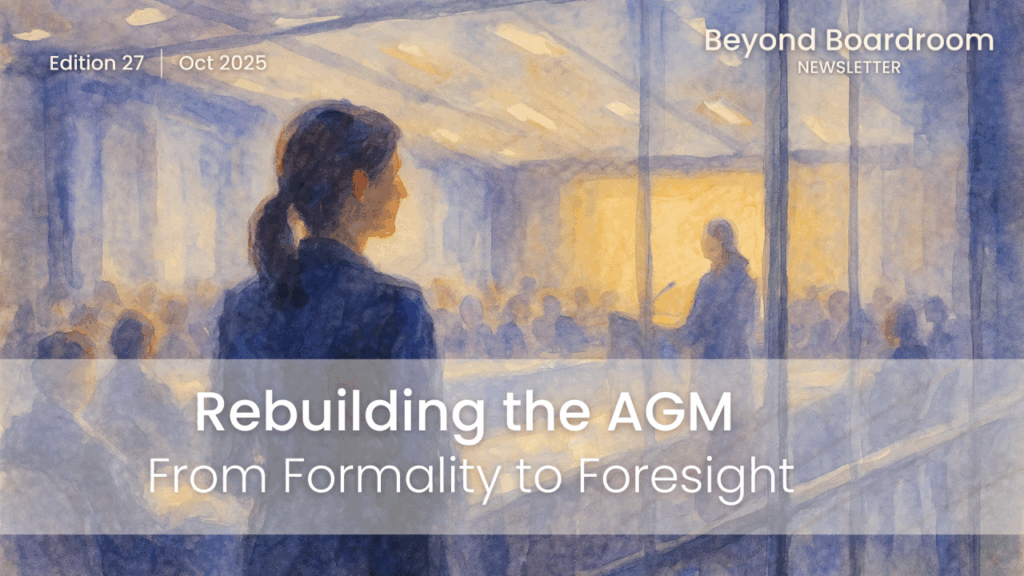Peter Drucker’s now-famous phrase, “Culture eats strategy for breakfast,” is repeated so often it’s practically leadership folklore. It’s turned up on mugs, murals, and keynote slides, and yet we rarely pause to ask: why does culture have such an appetite? And what happens when there’s nothing to stop it from going rogue?
Here’s my view, shaped by years of working with leadership teams behind the scenes, often when things are unravelling quietly but significantly: Without governance, culture eats itself – and takes your carefully crafted strategy along for the ride.
The Boardroom Isn’t Always What It Seems
Over the years, I’ve walked into countless boardrooms where everything looked impressive on the surface. Clear strategic goals. Market opportunities well understood. Culture described in glowing terms. But scratch beneath the surface and you often find a different picture – one where people are reluctant to challenge, where leadership styles go unchecked, and where the values that decorate the reception area bear little resemblance to day-to-day decision-making.
This isn’t a story of bad people doing bad things. It’s a story of silence – the gradual erosion of alignment. As noted by the Forbes Coaches Council, “culture is shaped by the worst behaviour leaders are willing to tolerate.
Culture Isn’t What You Say – It’s What You Do When No One’s Looking
Strategy gives you the direction. It’s the map, the plan, the slides that set the vision. But culture is the vehicle. It’s the lived experience of the people delivering that plan – how they’re treated, how they treat others, and how safe they feel to raise uncomfortable truths.
Research from the Institute of Business Ethics (IBE) shows that while 85% of companies have written values, only 30% report using them to guide decision-making at every level. This gap – between the declared and the demonstrated – is where culture quietly starts to misfire.
Without Guardrails, Culture Stops Being a Strength
We celebrate culture often – with awards, slogans, and hashtags. But culture isn’t always benign. In fact, the strongest cultures can become brittle when they are immune to scrutiny. Forbes warns us that “unchecked culture breeds silence,” particularly when high performers are allowed to sidestep the values the rest are expected to uphold.
Governance is what applies necessary tension. It holds culture to account, asks uncomfortable questions, and ensures challenge is not just tolerated, but welcomed. Without it, culture can become little more than a charismatic veneer.
Lessons from the Real World: When Culture Goes Unchecked
Take Enron – once hailed as one of America’s most innovative companies. The culture rewarded risk-taking, celebrated big wins, and turned a blind eye to ethical compromise. When governance collapsed, the culture cannibalised itself, leading to one of the biggest corporate scandals in modern history.
Or look at Boeing. Its internal culture, once defined by engineering excellence, shifted under commercial pressure. The 737 MAX crisis revealed a governance failure that allowed safety concerns to be buried in pursuit of market share.
Even Wells Fargo, a century-old institution, faced widespread criticism after a fake accounts scandal exposed a toxic internal culture driven by performance quotas, with governance mechanisms failing to intervene early.
Governance: More Than Meetings and Minutes
Good governance isn’t a filing cabinet. It’s the structure that translates purpose into practice. The UK Corporate Governance Code puts it clearly: governance should not simply ensure compliance – it should promote the long-term sustainable success of the company, generating value for stakeholders.
That means:
- Reward systems that reflect both outcomes and behaviours
- Mechanisms for truth to reach the top, not be filtered out
- Escalation routes that are clear, trusted, and free from retaliation
- Leaders who are held to the same standards they promote
Governance is not there to slow things down – it’s there to ensure you don’t speed off a cliff.
What Forbes Gets Right About Leadership and Culture
The Forbes article highlights three truths that should be pinned up in every C-suite:
- Culture is shaped by tolerated behaviour
- Leaders must model the behaviour they wish to scale
- The real measure of culture is how an organisation behaves under pressure
These are not optional extras. They are core competencies in a world where public scrutiny is high, employee activism is rising, and values-driven performance is a commercial imperative.
Strategy, Culture, Governance: Aligning for Impact
Let’s bring it together:

When one of these is weak, the organisation becomes unstable. But when all three are in balance, business becomes more than efficient – it becomes resilient.
If You’re a Leader, Start Here
- Audit your reward system Ask yourself: are you rewarding the loudest voice, or the one that models integrity? What gets recognised shapes what gets repeated.
- Make governance a partner in culture Involve your governance professionals early – not as sign-off, but as strategic partners. They see the red flags long before they’re on the risk register.
- Turn intention into infrastructure Values only matter when they show up in your systems – in how decisions are made, how people escalate concerns, and how leadership roles are filled.
Final Thought: Culture Needs Structure to Thrive
Leadership isn’t about charisma or having the best plan. It’s about building the systems that protect people, purpose, and progress – even when you’re not in the room.
You can impress stakeholders with strategy. You can inspire teams with culture. But only governance will safeguard both – and that’s where resilience lives.
Culture eats strategy. But without governance, culture eats itself – and takes breakfast, lunch, and the quarterly forecast with it.
Until next time, feed your culture, sharpen your strategy – but never skip governance,
Erika.

Erika Eliasson-Norris is the author of The Secret Diary of a Company Secretary, a candid and thought-provoking reflection on the realities of boardroom life, written to spark conversation and drive change across the governance profession. She is also CEO of Beyond Governance, where she advises boards, executives, and founders on building resilient governance structures that support long-term growth and institutional integrity. Erika serves as an Independent Assessor for the Post Office Horizon IT Inquiry, bringing her governance expertise to one of the UK’s most significant institutional accountability reviews.
The Secret Diary of a Company Secretary is available for preorder: https://thesecretdiaryofacompanysecretary.co.uk/



